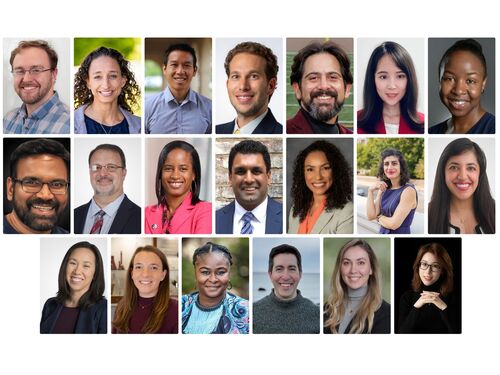Academies Release Educational Modules to Help Future Policymakers and Other Professional-School Students Understand the Role of Science in Decision Making
News Release
Last update June 30, 2016
WASHINGTON – A series of educational modules has been developed by the National Academies of Sciences, Engineering, and Medicine to help students in professional schools – law, public policy, medicine, journalism, and business – understand science and its role in decision making.
The nine sample modules, which explore topics such as shale gas development (“fracking”), vaccines, forensic pattern evidence, and scientific modeling, are intended for use by professional-school faculty who wish to help their students understand basic scientific principles and approaches, assess the evidence underlying scientific claims, and distinguish when there is genuine scientific consensus on an issue and when there are legitimate differences. The modules were authored by individual experts under the oversight of an Academies-appointed committee.
“During the course of their careers, most professional-school students will be required to make decisions in which scientific and technical knowledge play a critical role, but many of these students graduate without an adequate understanding of fundamental scientific principles or how to assess particular scientific claims,” said Paul Brest, former dean and professor emeritus (active), Stanford Law School, who co-chaired the committee that oversaw development of the modules.
“We hope that the modules will help these future decision makers begin to develop the understanding they need to assess and interpret the scientific evidence they will encounter,” said co-chair Saul Perlmutter, Franklin W. and Karen Weber Dabby Chair, University of California, Berkeley, and senior scientist, E.O. Lawrence Berkeley National Laboratory.
The sample modules, which use case studies to illustrate core principles in science and technology particularly relevant to critical thinking, are designed for professional school faculty to use either as parts of courses or as the basis for a course designed by individual faculty members. The Academies committee developed a set of guidelines for the development of the modules and then asked prominent members of the legal and scientific communities to submit proposals for modules on a range of topics where scientific information plays a key role in decision making. The committee met with prospective authors to discuss their proposals; after drafts of modules were developed, the committee reviewed the submissions and suggested refinements and enhancements and ultimately approved the content of the final modules. The committee’s goal was to provide materials that will serve as reference examples for developers of future modules.
The modules are available free online at http://sites.nationalacademies.org/pga/scipol_ed_modules/index.htm
The development of the modules was sponsored by the Gordon and Betty Moore Foundation and the National Biomedical Research Foundation. The National Academies of Sciences, Engineering, and Medicine are private, nonprofit institutions that provide independent, objective analysis and advice to the nation to solve complex problems and inform public policy decisions related to science, technology, and medicine. The Academies operate under an 1863 congressional charter to the National Academy of Sciences, signed by President Lincoln.
Contacts:
Sara Frueh, Media Officer
Rebecca Ray, Media Assistant
Office of News and Public Information
202-334-2138; e-mail news@nas.edu
Flickr: http://www.flickr.com/photos/nationalacademyofsciences/sets
THE NATIONAL ACADEMIES OF SCIENCES, ENGINEERING, AND MEDICINE
Division on Policy and Global Affairs
Committee on Science, Technology, and Law
Committee on Preparing the Next Generation of Policymakers for Science-Based Decisions
Paul Brest (co-chair)
Former Dean and Professor Emeritus
Stanford Law School
Stanford, Calif.
Saul Perlmutter1 (co-chair)
Franklin W. and Karen Weber Dabby Chair
Department of Physics
University of California, Berkeley; and
Senior Scientist
LBNL Physics Division
E.O. Lawrence Berkeley National Laboratory
Berkeley, Calif.
Arturo Casadevall2
Professor and Chair
W. Harry Feinstone Department of Molecular Microbiology and Immunology
Johns Hopkins Bloomberg School of Public Health
Baltimore
Joe S. Cecil
Project Director
Division of Research
Federal Judicial Center
Washington, D.C.
William Clark1
Harvey Brooks Professor of International Science, Public Policy, and Human Development
Harvard University John F. Kennedy School of Government
Cambridge, Mass.
Steven N. Goodman
Professor of Medicine, Health Research, and Policy and Associate Dean for Clinical and Translational Research
Stanford University School of Medicine
Stanford, Calif.
John D. Graham
Dean
School of Public and Environmental Affairs
Indiana University
Bloomington
Benjamin W. Heineman Jr.
Senior Fellow
Belfer Center for Science and International Affairs
Harvard University John F. Kennedy School of Government
Cambridge, Mass.
Dan Kahan
Elizabeth K. Dollard Professor of Law
Yale Law School
New Haven, Conn.
Fred. D. Ledley
Professor
Department of Natural and Applied Sciences
Bentley University
Waltham, Mass.
Cathy Manduca
Director
Science Education Center
Carlton College
Northfield, Minn.
Cathy Middlecamp
Professor
Nelson Institute for Environmental Studies and the Integrated Liberal Studies Program
University of Wisconsin
Madison
Jennifer Mnookin
Dean and David G. Price Professor of Law
School of Law
University of California
Los Angeles
Richard L. Revesz
Lawrence King Professor of Law,
Dean Emeritus, and
Director, Institute for Policy Integrity
New York University School of Law
New York City
Carl P. Simon
Professor of Mathematics and Economics
College of Literature, Science, and the Arts;
Professor of Public Policy
Gerald R. Ford School of Public Policy; and
Director
Science, Technology, and Public Policy Program
University of Michigan
Ann Arbor
STAFF
Steven Kendall
Study Director
1Member, National Academy of Sciences
2Member, National Academy of Medicine
More like this
Discover
Events
Right Now & Next Up
Stay in the loop with can’t-miss sessions, live events, and activities happening over the next two days.
NAS Building Guided Tours Available!
Participate in a one-hour guided tour of the historic National Academy of Sciences building, highlighting its distinctive architecture, renowned artwork, and the intersection of art, science, and culture.



